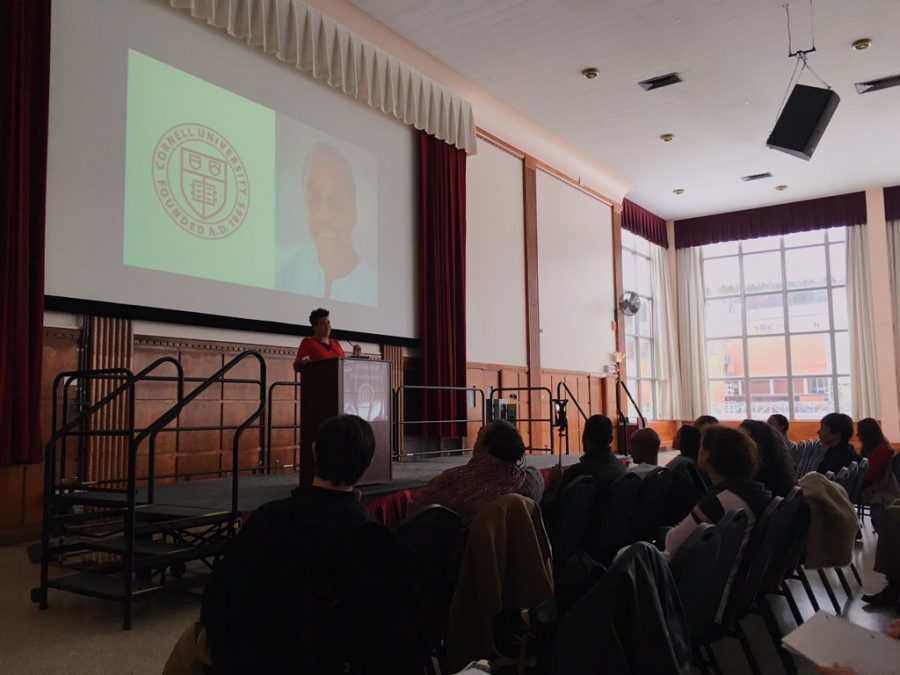University of Massachusetts students, faculty and members of the Amherst community dined and listened to poetry in celebration of International Women’s Day, with guest speakers on Thursday.
Rose Clemente, a “nominee for the green party in 2008… a doctoral candidate at UMass Amherst…and [a former] board member of Black Lives Matter”—as described by Hind Mari, director of the Women of Color Leadership Network Center for Women and Community—was the main feature of the seventh annual International Women’s conference.
Clemente kicked off Thursday evening’s event, in the UMass Student Union, with an hour-and-a-half long speech.
“I’ve been in Black studies all my life, and it has made me who I am,” Clemente said, “and I wouldn’t be standing here or done anything I’ve done if I had not, as an undergrad, taken my first Black studies class by a woman by the name of Doctor Vivian Verdell Gordon.”
According to Clemente’s website, Clemente is a “native of the South Bronx” but was raised in an upper-middle-class suburban neighborhood in Elmsford, New York. Both Puerto Rican and African-American, Clemente described her town as racially-diverse, yet she still felt isolated.
In high school, “the African-American community was a little more affluent than the white community, so my imagery, the pathology of the blackness was not something that I saw, [but] we were the only Latino family in the entire community,” Clemente said.
Often times when an individual gets involved with one movement, they consequently get involved with various other movements to not only learn, but to promote the very idea of activism, Clemente explained. Exemplifying this quality, Clemente has been involved with not only Black Lives Matter, but also with associations such as “the National Priorities Project, The Brecht Forum and the National Coalition to Abolish the Death Penalty,” according to the biography on her website.
“You just don’t join a movement and become an organizer,” Clemente said. “You can be an activist, but to be an organizer, you have to know your history, and we have to maybe come to the conclusion that the American project has been a failure since the beginning.”
Additionally, Clemente concentrated on the concept of “fixing the system,” the notion that a specific societal problem cannot be resolved until its members alter the mechanism that initially caused the uprising.
“There are three major problems within the electoral political system,” Clemente said. “First is the electoral college…second, if they don’t get rid of Citizens United that gives unlimited money now to candidates from corporations and third, there should be public financing of all campaigns, [which would then] also shorten campaigns.”
She added, “I think it is critically important that we share our stories, and often times, we are taught the history of oppression, but not the history of resistance, and not social justice and we need to pass that on. The reason that there is an Afro-American department or a gender and sexuality department, anything that is not the hetero-normative, Eurocentric academic discipline is because of students on a campus and the community outside.”
Andrea Hanley can be reached at [email protected].



















Susan Anthony • Mar 9, 2018 at 7:39 pm
Massachusetts has enacted the National Popular Vote bill.
The bill is 61% of the way to guaranteeing the majority of Electoral College votes and the presidency to the candidate who receives the most popular votes in the country, by changing state winner-take-all laws (not mentioned in the U.S. Constitution, but later enacted by 48 states), without changing anything in the Constitution, using the built-in method that the Constitution provides for states to make changes.
All voters would be valued equally in presidential elections, no matter where they live.
Candidates, as in other elections, would allocate their time, money, polling, organizing, and ad buys roughly in proportion to the population
Every vote, everywhere, for every candidate, would be politically relevant and equal in every presidential election.
No more distorting, crude, and divisive and red and blue state maps of predictable outcomes, that don’t represent any minority party voters within each state.
No more handful of ‘battleground’ states (where the two major political parties happen to have similar levels of support) where voters and policies are more important than those of the voters in 38+ predictable winner states that have just been ‘spectators’ and ignored after the conventions.
The bill would take effect when enacted by states with a majority of the electoral votes—270 of 538.
All of the presidential electors from the enacting states will be supporters of the presidential candidate receiving the most popular votes among all 50 states (and DC)—thereby guaranteeing that candidate with an Electoral College majority.
The bill was approved in 2016 by a unanimous bipartisan House committee vote in both Georgia (16 electoral votes) and Missouri (10).
Since 2006, the bill has passed 35 state legislative chambers in 23 rural, small, medium, large, red, blue, and purple states with 261 electoral votes.
The bill has been enacted by 11 small, medium, and large jurisdictions with 165 electoral votes – 61% of the way to guaranteeing the presidency to the candidate with the most popular votes in the country
NationalPopularVote